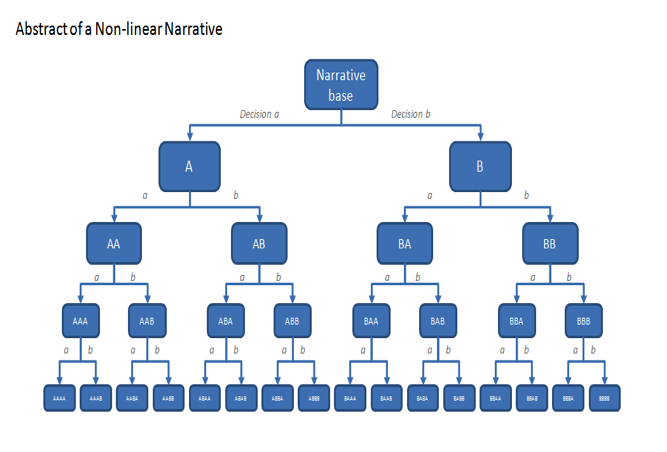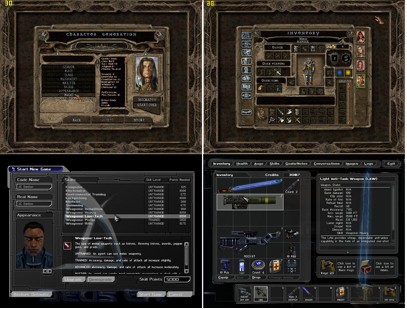Shoot, Strafe, Soliloquy: A Crisis in Videogame Narratives
Non Linear Narratives, a Deus Ex Machina?
'You will be who you will be. We are our choices. And we can choose to lead humanity away from this darkness'
Helios (Deus Ex)
Half-Life 2 seeks to fully immerse the player through its carefully orchestrated linear structure. The subtle integration of certain diegetic and ludic elements sustain the sensation of freedom within an essentially immutable narrative. Ludologists would likely argue that Half-Life 2 engages these techniques in order to cause temporary conflation between states of play and passive narrative absorption. How would this distinction be affected if the sequence of events became susceptible to player input? Would it be possible to 'play' the narrative? Games with non-linear structures attempt to achieve this goal. Player experience in these games is defined by the choices they make and the resulting impact on the game-world. Multiple genres of videogame utilise non-linear structures of play: TBS[i] games, god simulators, and open-world action games often embrace non-linearity. However, the focus of player engagement in such games is often exploration[ii] and experimentation[iii] rather than diegetic involvement. Instead, I shall investigate Deus Ex (2000) a narrative-driven RPG that boasts an intricate non-linear structure. In this game, choice and consequence are crucial aspects of the player's experience: you play JC Denton, a government agent who becomes involved in a global conspiracy. The player's decisions dictate who lives, who dies, and ultimately, the fate of a global order.
Many ludologists argue that games with non-linear formations reveal a conflict of purpose between narrative - a static entity- and simulation - a structure that hosts changing variables. Noted ludologist Greg Costikyan suggests that 'there is a direct, immediate conflict between the demands of a story and the demands of a game. Divergence from a story's path is likely to make for a less satisfying story; restricting a player's freedom of action is likely to make for a less satisfying game' (8). Indeed, an absolutely non-linear narrative would require every single choice to produce a divergent instance of the game-world. Such a system would produce an exponentially diverging narrative tree, soon becoming totally unmanageable. [Please refer to figure 5.1] The diagram provided is a simple abstraction of such a process: it shows a narrative which begins at a fixed coordinate, but then allows the player four choices, each one providing two possible outcomes. Even this minor number of choices produces a staggering thirty-two possible outcomes, each one individual from the rest. Such propagation would quickly produce thousands of individual permutations, with a rate of expansion Imagine a player faced with non-binary decisions (as total freedom would necessitate), and this model becomes almost unintelligibly complex.
Such structures have proven an impossible task for any game developer due to the sheer scale of resources required: each eventuality must contain pre-produced content. Narrative theorist Bryan Loyall, observes that such a system is equivalent to 'collecting an acting company whose sole job is to allow a single person to participate in an interactive drama' (3). This is in fact a gross simplification. Games are not autonomous entities like human beings, every tiny, microscopic variable must be accounted for. Achieving a truly nonlinear gaming narrative is more akin collecting an acting company the size of China and directing all participants simultaneously regarding every minute action they undergo, and is therefore nearly impossible to achieve. Even if such a feat were feasible, such fracturing is also highly undesirable when seeking narrative coherence. If a player is consistently offered choices that have significant impact on the plot the result is many disparate, and most likely unsatisfying conclusions. This begs the question, does Deus Ex manage to avoid the dissonance signalled by Costikyan’s argument about choice?

[Figure 5.1] Diagram of non-linear narrative structure

[Figure 5.2] Inventory and character creation screens from Baldur's Gate II (2001) and Deus Ex.
Because Deus Ex employs a complex structure of action and consequence, and it is important to first establish the general nature of player interaction. Deus Ex is a genre hybrid that is most easily categorised as an RPG-FPS. As in Half-Life 2, combat takes place in first-person, but players are free to customise their character's abilities, appearance and weapons, as well as selecting from multiple responses in conversations. These complex functions are conducted through a series of screens that (unlike Half Life 2) regularly displace the player from first person viewpoint. The oscillation between perspectives and states of interaction results in a highly 'configurative' player experience: Deus Ex wants players to experience a degree of control and awareness a meta-layer above that of Half-Life 2.
In this manner, Deus Ex is an active proponent of the ‘configurative dynamic’ that Eskelinen believes is the foundation of play. The degree of choice afforded to players in character development is mirrored in the level design: every environment is designed to provide several routes by which the objectives can be achieved, sometimes these even producing differing results. For instance, if the player is asked to recover a data disk from a warehouse, they may sneak in through vents and use non lethal weapons to escape or they may hack the security systems and attempt a frontal assault; in some cases the possibilities are legion.
The narrative actually responds to many of these choices with differing repercussions. It makes no sense for NPCs to react similarly if the player kills every combatant or never uses lethal force. Deus Ex responds accordingly to such choices: rarely murder enemies and Paul (the protagonist’s brother) will respond with praise, kill everyone you encounter and your brother quickly admonishes you for being murderous. In a reciprocal manner, dialogue choices can affect access to critical resources and combat abilities: endear yourself with your doctor, Jaime Reyes, and extra combat augmentations become available. The narrative and gameplay of Deus Ex are a connected system whereby changes in one may affect the other.
It is, then, vital to ask the degree of effect these choices have upon the narrative of Deus Ex. As discussed, only a finite number of permutations can exist. Certain elements of the narrative are unchangeable (what I shall here refer to as the 'core narrative'):
‘you are J C Denton, an agent working for a government organization known as UNATCO. The world has been plunged into chaos by the arrival of a virus known as the 'grey death, and Denton in pursuit of a terrorist group known as the NSF who are attempting to intercept and redistribute the cure. In the process of doing so, Denton discovers that UNATCO is actually commanded by a rogue element of the illuminati called Majestic-12, and is manufacturing the grey death while simultaneously preparing to take control of the world's communications using a hyper-advanced artificial intelligence. Denton defects to the NSF, destroys the plague manufacturing facility, and eventually assaults the headquarters of Majestic-12 just in time to prevent their leader from assuming absolute control of the world's computer networks.’
This 'core narrative' contains the immutable aspects of every player's experience. However, there are a myriad of choices the player encounters along the way which affect the specific shape of events. These elements I shall call the 'dynamic narrative', and consist of events and decisions the player must experience while traversing the ‘core narrative’. The dynamic narrative can occur differently from player to player, depending on their decisions. [Please refer to V. C1]. In this series of video clips the player is faced with a dilemma: having captured an NSF leader, they are ordered to by Agent Navarre (an vindictive UNATCO agent) to terminate the prisoner. All three parts of the video clip shows the player approaching this dilemma in different ways. In part one the player obeys Navarre, leaves, and the prisoner is terminated, in part two the player disobeys by continuing to interrogate the prisoner and is killed by Navarre, and finally, in part three the player pre-emptively kills Navarre in order to continue interrogating.
[V. C1] Several playthroughs of a confrontation with Agent Navarre in Deus Ex
Contents . 1 . 2 . 3 . 4 . 5 . 6 . 7 . 8 . 9
[ii]Grand Theft Auto 3 (2001) and Just Cause (2006) provide the player with a city and island respectively which the player is encouraged to explore. In these 'sandbox' environments objectives can mostly be pursued in whatever order the player chooses.
[iii] Turn-Based-Strategy games such as Civilisation (1991), or more recently, Spore (2008) allow the player constructs a virtual society using a provided toolset. The 'narrative' emerges from playing with these tools and is not pre-written. Similarly, in The Sims (2000) players produce their own 'narratives' through manipulating the variables in their simulated houses. These dynamics resemble lab experiments more and occur through on the fly with no predetermined outcomes.
